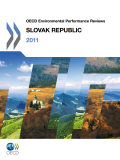
This 2011 review of the Slovak Republic's environmental policies and programmes covers recent developments, greening growth, implementation of environmental policies, climate change and energy, agriculture and the environment and international cooperation.
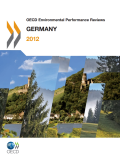
This OECD Environmental Performance Review provides an independent assessment of Germany’s progress in achieving domestic and international environmental policy commitments, together with policy relevant recommendations. It has been conducted to promote peer learning, to enhance countries’ accountability to each other and to the public, and to improve governments’ environmental performance, individually and collectively. These Reviews are supported by a broad range of economic and environmental data. Each cycle of the Environmental Performance Reviews covers all OECD member countries and selected partner countries.
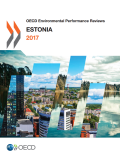
OECD Environmental Performance Reviews provide independent assessments of countries’ progress towards their environmental policy objectives. Reviews promote peer learning, enhance government accountability, and provide targeted recommendations aimed at improving environmental performance, individually and collectively. They are supported by a broad range of economic and environmental data, and evidence-based analysis. Each cycle of Environmental Performance Reviews covers all OECD countries and selected partner economies.
This report is the first Environmental Performance Review of Estonia. It evaluates progress towards sustainable development and green growth, with a focus on waste and materials management, and mining and the environment.
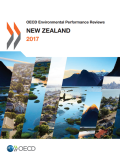
OECD Environmental Performance Reviews provide independent assessments of countries’ progress towards their environmental policy objectives. Reviews promote peer learning, enhance government accountability, and provide targeted recommendations aimed at improving environmental performance, individually and collectively. They are supported by a broad range of economic and environmental data, and evidence-based analysis. Each cycle of Environmental Performance Reviews covers all OECD countries and selected partner economies. The most recent reviews include Chile and France (2016).
This report is the third Environmental Performance Review of New Zealand. It evaluates progress towards sustainable development and green growth, with a focus on water resources management and sustainable urban development.
New Zealanders enjoy a high environmental quality of life and access to pristine wilderness. However, New Zealand’s growth model, based largely on exploiting natural resources, is starting to show its environmental limits with increasing greenhouse gas emissions and water pollution.
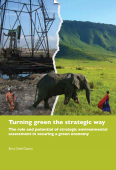
Strategic environmental assessment (SEA) is a powerful process for integrating environmental and linked social and economic concerns into policy-making, planning, programme development, mega projects and development decision-making. Over the last 20 years there has been increasing uptake of SEA around the world. More than 60 countries at all levels of development (including all 27 EU member states) now have legislation, policies, directives or regulations prescribing the application of SEA, and many more are introducing it as part of their policy toolkits – although it is not necessarily used effectively and many development actors are unaware of its function, value and potential. At the UN Rio+20 conference in 2012, the emergent green economy concept was a central theme, but it was agreed that nationally (as opposed to globally) driven approaches should be the way forward, so that green economy policies can be properly tailored. Attention has therefore turned to how SEA can help in promoting a transition to green economic development.
